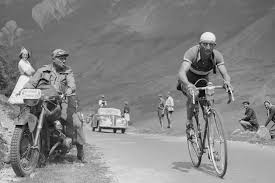
Gino
The pattern of the humanity heroism is diverse, whereas the roles of some figures, which glisten like gold, or, at least, silver, are no less significant than the others. One of the threads is Gino Bartali, an Italian professional cyclist who won the Tour de France; however, his heroic actions were performed hidden from the public eye. This chronicle unveils the story of a two-wheeled giant who converted all his popularity into a force for the delivery during the last worst days of the Second World War.
Bartali’s narrative is one of comparative light and dark: the virtuoso on his bicycle and a hidden warrior. It questions the definition of heroes, proposing that great men and women can toil in obscurity, swinging their legs over history’s wheel and shifting the tides with inglorious revolutions.
Thus, to tell the story of Bartali let’s start from the fact that this champion of velodrome became the champion of people. We shall see how the same legs that propelled him to triumphs in Tour de France and Giro d’ Italia moved him on dangerous rescues to save hundreds of people. Bartali’s story is not simply narration of past glories – it is an imperative for today and for the future calling everyone to search for the hero in the everyday life.
Gino Bartali’s brilliant climb in proficient cycling shocked eyewitnesses, as he quickly prevailed the sport’s tip top positions.. His strong limbs and an unconquerable spirit saw him win the toughest races in the sport, which also led to th name ‘Gino the Pious,’ due to his deep Catholic faith. But few in the world knew, that this piety would give birth to a courage far beyond anything sport can possibly fathom.
As World War II loomed and darkness descended, Bartali faced a choice. The adulation he received as Italy’s greatest athlete afforded him an opportunity to resist in secret. Bartali — far cannier than his public face suggested — turned a bicycle into something more than a machine with which to ride fast in circles.
The contrast between Bartali’s public and private lives could not have been more stark. In the daylight hours, he was Italy’s greatest sportsman, a star loved by a country desperately in need of something to cheer. In the darkness, he was a ghost, an unknown hero racing through the night in a bid to keep hope alive amid the maelstrom of war and intolerance. It was a balancing act that would have destroyed lesser men; but, for Bartali, it was merely another challenge.During his excursions, Bartali is thought to have saved the lives of up to 800 Jews – 800 victories worth far more than any yellow jersey or laurel wreath. Incredible as that may seem, what is most extraordinary about this tale of courage and redemption is that Bartali kept quiet about his brave wartime activities for so long after peace had finally come. For decades after Il Guerriero last laid down his bicycle at his training camp on Italy’s Etruscan Coast and retreated from public view into stubborn silence our questions about what he had done during the greatest conflict in history were answered with either a shrug of indifference or an irreverent quip.
It wasn’t until after Bartali’s death, however, that the full scope of his wartime valor would come to light. In the aftermath of the German occupation, a collection of survivors began to emerge; their accounts wove together like the spokes of a wheel. They described a man whose heroism was equaled only by his compassion. And later, in 2013, inspired by Blatter sports editor Daniel Johnson’s biography of Bartali and an article by CNN television producer Chris Livesay, I retraced Bartali’s training journey from Florence to Assisi in reverse – now in sunny midsummer heat – and came away with several unforgettable stories of my own.
Gino Bartali’s legacy stands beyond the world of sports, serving as a proof of man’s ability to act in opposition to evil. This narrative calls on us to look at various angles, discover the exceptional in ordinary happenings and understand that sometimes a great change starts from turning a wheel.
Bartali’s tale is a reminder of what true heroism means when the term is often wrongly used for celebrities. The point here is that greatness is not about searching publicity but guiding others even when – especially when – no one watches.We are left pondering on Bartali’s life with few questions: What untapped inner resources do we have? What tiny acts of bravery can change history forever? Bartali’s legacy makes us see that each one of us could be like spokes in changing wheels moving towards another better day.
By: YENUGULA UMESH CHANDRAN
Write and Win: Participate in Creative writing Contest & International Essay Contest and win fabulous prizes.


